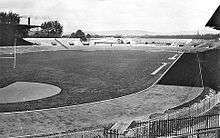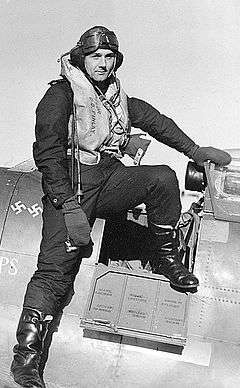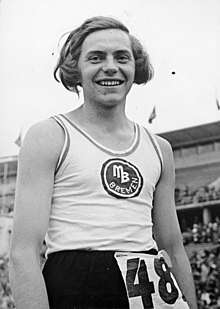1938 European Athletics Championships
The 2nd European Athletics Championships was a continental athletics competition for European athletes which was held in two places in 1938. The men's event took place in Paris, France between 3–5 September while the women's events were in Vienna, Austria (at the time part of German Reich) on 17 and 18 September. A total of 32 events were contested at the two competitions, comprising 23 events for men and 9 for women. This was the first time that events for women were held and the only occasion on which the competition was held in two separate locations.[1]
| 2nd European Championships | |
|---|---|
 Logo for the women's competition in Vienna | |
| Dates | 3–5 September (men) 17–18 September (women) |
| Host city | Paris, France (men) Vienna, German Reich (women) |
| Venue | Stade Olympique de Colombes (men) Praterstadion (women) |
| Events | 32 |
| Participation | 352 athletes from 23 nations |
| Records set | 1 world record 1 European record |

Germany topped the medals table with twelve gold medals and 32 in total. Finland won the second greatest number of gold medals (5) and eleven medals in total. The next most successful nations were Great Britain (four golds and eight overall) and Sweden (three golds and a total of thirteen medals). France won a medal of each colour in Paris, with Prudent Joye the sole Frenchman to win a gold for the hosts of the men's championships.
In the men's competition at Stade Olympique de Colombes in Paris, Donald Finlay of Great Britain broke the European record to win the 110 metres hurdles. Tinus Osendarp of the Netherlands won a sprint double, breaking two championship records. World record holder Sydney Wooderson took victory in the 1500 metres while Olympic gold medallists Matti Järvinen (javelin), Karl Hein (hammer) and Harold Whitlock (50 km walk) won their specialities. Finnish runners Taisto Mäki, Ilmari Salminen and Väinö Muinonen won all three of the long distance running events at the championships, upholding the country's reputation as the Flying Finns.[1] Contemporaneous reports on the men's event were given in the Glasgow Herald.[2][3]
Stanisława Walasiewicz of Poland excelled in the women's events at the Ernst-Happel-Stadion in Vienna, winning both the 100 and 200 metres, as well as silver medals in the long jump and 4 x 100 metres relay. Italian athlete Claudia Testoni set a world record of 11.6 seconds over the 80 metres hurdles. Outside these highlights, the German women dominated the competition by winning 15 of the 27 women's medals on offer. Among them were Käthe Krauß (who won two silvers in the sprints), 1936 Berlin Olympics champion Gisela Mauermayer (who won the discus and a silver in the shot put) and Lisa Gelius, who completed a usual double of silver in the hurdles and gold in the javelin throw.[1] Among the minor medallists was Fanny Blankers-Koen, who won the first international medals of her highly successful career. Dora Ratjen was the initial winner of the women's high jump, but this was rescinded after it was discovered that he was in fact a man.[4] A contemporaneous report on the women's event was given in the Glasgow Herald.[5]
Medal summary
Complete results were published.[6]
Men
| Event | Gold | Silver | Bronze | |||
|---|---|---|---|---|---|---|
| 100 metres |
10.5 CR | 10.6 | 10.6 | |||
| 200 metres |
21.2 CR | 21.6 | 21.6 | |||
| 400 metres |
47.4 CR | 48.2 | 48.8 | |||
| 800 metres |
1:50.6 CR | 1:51.6 | 1:52.0 | |||
| 1500 metres |
3:53.6 CR | 3:54.5 | 3:55.2 | |||
| 5000 metres |
14:26.8 CR | 14:27.4 | 14:29.2 | |||
| 10,000 metres |
30:52.0 CR | 30:53.2 | 30:57.8 | |||
| 110 metres hurdles |
14.3 CR, AR | 14.5 | 14.8 | |||
| 400 metres hurdles |
53.1 CR | 53.3 | 53.6 | |||
| 3000 metres steeplechase |
9:16.2 | 9:19.2 | 9:21.4 | |||
| 4 × 100 metres relay |
Manfred Kersch Gerd Hornberger Karl Neckermann Jakob Scheuring | 40.9 CR | Gösta Klemming Åke Stenqvist Lennart Lindgren Lennart Strandberg | 41.1 | Maurice Scarr Godfrey Brown Arthur Sweeney Ernest Page | 41.2 |
| 4 × 400 metres relay |
Hermann Blazejezak Manfred Bues Erich Linnhoff Rudolf Harbig | 3:13.7 CR | Jack Barnes Alfred Baldwin Alan Pennington Godfrey Brown | 3:14.9 | Lars Nilsson Carl Hendrik Gustafsson Börje Thomasson Bertil von Wachenfeldt | 3:17.3 |
| Marathon |
2:37:28.8 CR | 2:39:03.0 | 2:42:13.6 | |||
| 50 kilometres walk |
4:41:51 CR | 4:43:54 | 4:44:35 | |||
| High jump |
1.97 m | 1.94 m | 1.94 m | |||
| Pole vault |
4.05 m CR | 4.00 m | 4.00 m | |||
| Long jump |
7.65 m CR | 7.61 m | 7.56 m | |||
| Triple jump |
15.32 m CR | 14.95 m | 14.73 m | |||
| Shot put |
15.83 m CR | 15.59 m | 15.52 m | |||
| Discus throw |
49.70 m | 49.48 m | 48.72 m | |||
| Hammer throw |
58.77 m CR | 57.34 m | 51.23 m | |||
| Javelin throw |
76.87 m CR | 75.00 m | 72.78 m | |||
| Decathlon |
6870 pts CR | 6661 pts | 6444 pts | |||
WR world record | AR area record | CR championship record | GR games record | NR national record | OR Olympic record | PB personal best | SB season best | WL world leading (in a given season) | ||||||
Women
| Event | Gold | Silver | Bronze | |||
|---|---|---|---|---|---|---|
| 100 metres |
11.9 | 12.0 | 12.0 | |||
| 200 metres |
23.8 | 24.4 | 24.9 | |||
| 80 metres hurdles |
11.6 WR | 11.7 | 11.8 | |||
| 4 × 100 metres relay |
Josefine Kohl Käthe Krauß Emmy Albus Ida Kühnel | 46.8 | Jadwiga Gawronska Barbara Ksiazkiewicz Otylia Kaluzowa Stanisława Walasiewicz | 48.2 | Maria Alfero Maria Apollonio Rosetta Cattaneo Italia Lucchini | 49.4 |
| High jump |
1.64 m | 1.64 m | 1.64 m | |||
| Long jump |
5.88 m | 5.81 m | 5.47 m | |||
| Shot put |
13.29 m | 13.27 m | 12.55 m | |||
| Discus throw |
44.80 m | 40.95 m | 39.81 m | |||
| Javelin throw |
45.58 m | 44.14 m | 42.49 m | |||
WR world record | AR area record | CR championship record | GR games record | NR national record | OR Olympic record | PB personal best | SB season best | WL world leading (in a given season) | ||||||
Medal table


* Host nations (Germany & France)
| Rank | Nation | Gold | Silver | Bronze | Total |
|---|---|---|---|---|---|
| 1 | 12 | 11 | 9 | 32 | |
| 2 | 5 | 3 | 3 | 11 | |
| 3 | 4 | 2 | 2 | 8 | |
| 4 | 3 | 4 | 6 | 13 | |
| 5 | 2 | 3 | 1 | 6 | |
| 6 | 2 | 2 | 4 | 8 | |
| 7 | 1 | 4 | 3 | 8 | |
| 8 | 1 | 1 | 1 | 3 | |
| 1 | 1 | 1 | 3 | ||
| 10 | 1 | 0 | 0 | 1 | |
| 11 | 0 | 1 | 0 | 1 | |
| 12 | 0 | 0 | 1 | 1 | |
| 0 | 0 | 1 | 1 | ||
| Totals (13 nations) | 32 | 32 | 32 | 96 | |
Participation
According to an unofficial count, 350 athletes from 23 countries participated in the event, two athletes less than the official number of 352 as published.[7]
|
|
|
|
|
References
- History of the European Athletics Championships Archived 30 September 2010 at the Wayback Machine. European Athletics (25 July 2006). Retrieved 21 August 2010.
- "Three Athletics Titles Won by Britain - European Record for Finlay: Carstairs Sixth in 5000 Metres", Glasgow Herald, p. 19, 5 September 1938, retrieved 21 August 2014
- "Lovelock Record Still Stands - Wind Handicaps Wooderson - Britain's Athletic Success", Glasgow Herald, p. 2, 6 September 1938, retrieved 21 August 2014
- Dora Ratjen Biography. Sports-reference. Retrieved 21 August 2010.
- "European Women's Championship", Glasgow Herald, p. 19, 19 September 1938, retrieved 21 August 2014
- European Athletics Championships Zürich 2014 - STATISTICS HANDBOOK (PDF), European Athletics Association, pp. 363–367, retrieved 13 August 2014
- European Athletics Championships Zürich 2014 - STATISTICS HANDBOOK (PDF), European Athletics Association, p. 4, retrieved 13 August 2014
- "European Championships (Men)". gbrathletics.com. 2007. Archived from the original on 2 September 2010. Retrieved 21 August 2010.
- "European Championships (Women)". gbrathletics.com. 2007. Archived from the original on 22 September 2010. Retrieved 21 August 2010.
External links
| Wikimedia Commons has media related to 1938 European Championships in Athletics. |